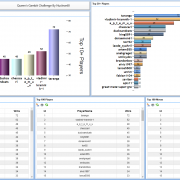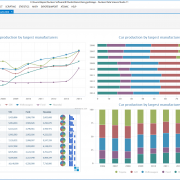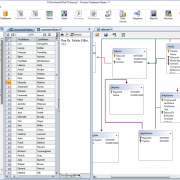Posts
New Product Releases: Warm welcome to Neo4J Graph Database System
/in Business Intelligence, News, Posts/by Nucleon SoftwareQueens Gambit Challenge Demo
/in BI Samples, Nucleon BI, Posts, Resources, Samples/by Nucleon SoftwareNew Releases and The Next Big Thing: Quantum Computing
/in News, Posts/by office_6ca4lf8oNew Product Releases
11.11.2020 – Afyonkarahisar, Turkiye: It is a the next big day for Nucleon Software. We are proud to announce the release of our products.
Nucleon BI Studio, BI Viewer, DS Studio, Data Browser, Command Runner, BizApp Studio, BizAppCenter and Database Master are released and they have the build version 11.0.33.21120. We also changed the name of Data Studio to Data Browser.
We add powerfull and new features, solved some DLL Problems and other issues.
- We updated all database and data source clients to new versions
- We changed product name from “Data Studio” to “Data Browser”
- Scripting (R, Python etc.) modules are integrated to our products
- GraphQL integration is improved
- Solved MongoDB integration and connection problems
- Solved Couchbase integration and connection problems
- CSV-File ingreation is improved and can load any size of CSV file now.
- JQL is improved
- We add CSV2 file format, it is a new file format with field-type and file encoding definition.
- Amazon AWS integraton is improved
and the The Next Big Thing is our quantum computing development studio. It is under development…
What is business intelligence?
/in Knowledge Base, Posts, Resources/by office_6ca4lf8oBusiness intelligence (BI), is an umbrella term that refers to a variety of software applications used to analyze an organization’s raw data. BI as a discipline is made up of several related activities, including data mining, online analytical processing, querying and reporting. BI is a technology-driven process for analyzing data and presenting actionable information to help corporate executives, business managers and other end users make more informed business decisions.
BI encompasses a variety of tools, applications and methodologies that enable organizations to collect data from internal systems and external sources, prepare it for analysis, develop and run queries against the data, and create reports, charts, dashboards and data visualizations to make the analytical results available to corporate decision makers as well as operational workers.
The potential benefits of business intelligence programs include accelerating and improving decision making; optimizing internal business processes; increasing operational efficiency; driving new revenues; and gaining competitive advantages over business rivals. BI systems can also help companies identify market trends and spot business problems that need to be addressed.
BI data can include historical information, real time and as well as new data gathered from source systems as it is generated, enabling BI analysis to support both strategic and tactical decision-making processes. Initially, BI tools were primarily used by data analysts and other IT professionals who ran analyses and produced reports with query results for business users. Increasingly, however, business executives and workers are using BI software themselves, thanks partly to the development of self-service BI and data discovery tools.
Business intelligence combines a broad set of data analysis applications, including ad hoc analysis and querying, enterprise reporting, online analytical processing (OLAP), mobile BI, real-time BI, operational BI, cloud and software as a service BI, open source BI, collaborative BI and location intelligence. BI technology also includes data visualization software for designing charts, reports, maps and other infographics, as well as tools for building BI dashboards and performance scorecards that display visualized data on business metrics and key performance indicators in an easy-to-grasp way. BI applications can be bought separately from different vendors or as part of a unified BI platform from a single vendor.
BI programs can also incorporate forms of advanced data analytics, such as data mining, data visualization, predictive analytics, text mining, GIS maps, statistical analysis and big data analytics. In many cases though, advanced analytics projects are conducted and managed by separate teams of data scientists, statisticians, predictive modelers and other skilled analytics professionals, while BI teams oversee more straightforward querying and analysis of business data.
Business intelligence data typically is stored in a data warehouse or smaller data marts that hold subsets of a company’s information. In addition, Hadoop, Nucleon grid like Map&Reduce systems are increasingly being used within BI architectures as repositories or landing pads for BI and analytics data, especially for unstructured data, log files, sensor data and other types of big data.
Before it’s used in BI applications, raw data from different source systems must be integrated, consolidated and cleansed using data integration and data quality tools to ensure that users are analyzing accurate and consistent information.



